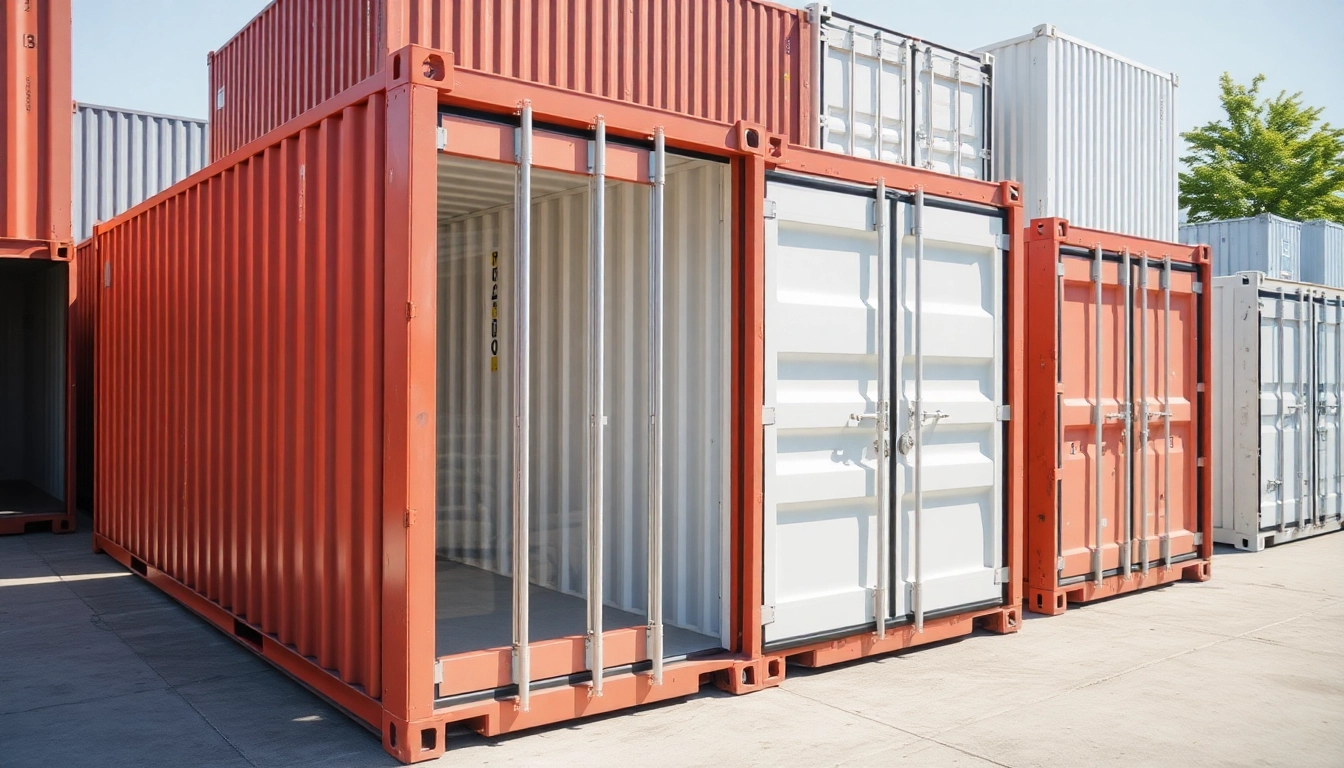Understanding Container Rental: Types, Sizes, and Uses
Container rental has become an essential component in various industries, offering versatile, secure, and scalable storage solutions. Whether for construction projects, retail enterprises, events, or personal needs, understanding the different types and sizes of containers available for rent is crucial to making informed decisions that align with your operational requirements. Exploring these options allows you to select the most suitable container, ensuring efficiency, cost-effectiveness, and durability. If you’re considering container hire, it’s vital to comprehend the specifications, available types, and how they can be tailored to specific applications.
For those new to the concept, a Container rental offers a flexible alternative to purchasing, providing access to high-quality units without the long-term commitment or maintenance responsibilities. This article dives deep into the nuances of container sizes, types, and their practical applications, equipping you with the knowledge to optimize your storage and logistical operations in the UK market.
Common Container Sizes and Specifications for Rental
One of the primary considerations when choosing a container for rental is size. The most common container sizes in the UK are standardized to facilitate ease of transportation and stacking, making them ideal for a range of indoor and outdoor applications. Below are the most prevalent dimensions:
- 10ft Containers: Compact and highly portable, these containers are perfect for small-scale storage, site offices, or mobile units on construction sites. They typically offer around 75 to 80 square feet of internal space, suitable for tools, equipment, or small inventory items.
- 20ft Containers: The most popular size for general use, providing approximately 150 square feet of internal capacity. They are versatile and can serve as storage units, shipping containers, or modified units for conversion purposes like offices or workshops.
- 40ft Containers: Offering about 300 square feet, these are ideal for large-scale storage needs, international shipping, or as the basis for extensive modifications. They are widely used in commercial and industrial sectors for their capacity and robustness.
Additional variations include high-cube containers, which are taller (~9.5 ft in height) to provide increased internal volume, and specialized containers with reinforced walls, insulation, or ventilation tailored for specific cargo such as perishables or fragile goods. Understanding these specifications helps in accurately matching the container to your storage duration, content fragility, and operational logistics.
Different Types of Containers: Standard, Refrigerated, and Custom Options
Beyond size, the type of container you select influences functionality, security, and compliance. Standard containers, often used for general storage and transport, are made from high-strength steel, designed to withstand harsh conditions. They are lockable, weatherproof, and durable, making them suitable for most applications.
Refrigerated Containers (Reefer Containers): These specialized units are essential for transporting or storing perishable goods. Equipped with temperature control systems, reefer containers maintain specific climate conditions, ranging from freezing to ambient temperatures. They are commonly used in the food, pharmaceutical, and floral industries.
Custom Options: Many providers, including those in the UK market, offer container modifications to meet unique needs. These include conversions into mobile offices, workshops, retail outlets, or accommodations. Custom features may encompass insulation, electrical wiring, windows, doors, shelving, or ventilation systems. Investing in custom containers expands the range of practical applications—from popup shops during events to temporary housing on remote sites.
Understanding the distinctions among these types enables businesses to optimize their investments, enhancing operational efficiency while ensuring compliance with safety and environmental standards.
Ideal Applications for Container Rental in Various Industries
Container rental has a broad spectrum of industrial and commercial applications in the UK. Here are some primary sectors leveraging container solutions:
- Construction and Infrastructure: Renting containers for secure storage of tools, materials, and safety equipment on-site. They also serve as site offices or changing rooms, facilitating smooth project workflows.
- Retail and E-commerce: Pop-up shops, temporary storage for inventory, and mobile retail units benefit from customized containers that combine branding with functionality.
- Event Management: Temporary storage for equipment, staging materials, and catering supplies at festivals, exhibitions, or corporate events, with portable units that can be relocated easily.
- Industrial and Manufacturing: Long-term storage of raw materials or finished goods, especially when space constraints exist within existing facilities.
- Warehousing and Logistics: Flexible storage solutions that adapt to fluctuating demand, such as seasonal peaks or emergency stockpiles.
- Agriculture and Fisheries: Storage of perishables or equipment, often requiring climate-controlled units for premium produce.
Each industry benefits from tailored container solutions that increase operational efficiency, reduce costs, and improve safety standards.
How to Choose the Right Container Rental Provider
Evaluating Rental Terms, Delivery Options, and Customer Support
Selecting a reliable container rental provider is vital to ensure the success of your project. Begin by assessing the rental terms, which should include duration flexibility, renewal options, and clear policies on damages or replacements. Delivery and collection are also critical; providers should offer nationwide coverage across the UK with convenient scheduling options that suit your operational deadlines.
Excellent customer support is fundamental. A reputable provider will assign dedicated account managers, provide prompt assistance, and maintain open lines of communication. This level of service minimizes delays and clarifies any contractual obligations, ensuring a smooth rental experience.
It’s advisable to review online testimonials, client references, and industry certifications. Transparency regarding contractual terms and responsive customer service are strong indicators of a trustworthy container hire partner.
Pricing Models and Cost Considerations for Container Hire
Understanding the various pricing models helps in managing your budget effectively. Container rental costs depend on factors such as size, type, rental duration, and additional services like delivery, installation, or customization. Common pricing structures include:
- Fixed weekly or monthly rates: Simplifies budgeting, especially for long-term rentals.
- Pay-as-you-go: Suitable for short-term or ad-hoc needs, often with higher per-week rates.
- All-inclusive packages: Covering delivery, pickup, and any modifications, reducing administrative complexity.
In the UK, rental prices for standard 20ft containers can start from as low as £50-£100 per month, with additional costs for delivery—often between £50 and £200 depending on distance and accessibility. Long-term arrangements or bulk rentals usually command discounts. Comparing quotes from several providers, considering hidden costs, and evaluating value-added services will ensure you get the best deal.
Assessing Provider Reputation and Quality Standards in the UK Market
Trustworthy providers maintain high standards for container quality, safety, and compliance with UK regulations. Look for certifications such as ISO standards, adherence to safety protocols, and positive customer reviews. Reputable companies will also offer transparency regarding the condition of their containers—whether new, refurbished, or used—and provide warranties or guarantees.
Checking their track record in the UK market, industry memberships, and logistical capabilities provides further assurance. Delivery reliability, availability of various sizes and types, and after-sales support are crucial factors influencing the overall rental experience.
Best Practices for Hiring Containers Effectively
Planning Your Container Needs Based on Project Requirements
Effective planning ensures you select the right container size, type, and rental duration. Conduct a thorough assessment of your storage volume, access points, and environmental conditions. Consider future expansion needs, and factor in logistical constraints such as transportation routes and site accessibility.
Developing a comprehensive plan reduces the risk of under or overestimating your needs, ultimately saving costs and ensuring operational continuity.
Ensuring Secure and Insured Container Rental Agreements
Security is paramount—look for containers with robust locking mechanisms and sturdy construction. Verify that the rental agreement includes insurance coverage for damages, theft, or vandalism, shielding your operations from unforeseen liabilities.
Understand the provider’s policies on damages, replacements, and liability. Clear contractual terms and proper insurance coverage safeguard your investment and maintain peace of mind throughout the rental period.
Maintaining and Managing Rented Containers for Longevity
Proper maintenance prolongs the lifespan of the rented containers, ensuring they remain functional and secure. Regular inspections for corrosion, structural integrity, and security features are recommended. Keep the container clean and free from debris to prevent deterioration.
Implementing logistical management practices, such as tracking rental periods and scheduling maintenance, optimizes usage and delays the need for costly replacements.
Maximizing Value with Container Rental: Tips and Case Examples
Cost-Saving Strategies for Long-Term Rentals
To reduce expenses, consider negotiating long-term contracts for discounted rates and bundling services like delivery and customization. Opt for container types that meet your needs precisely, avoiding unnecessary upgrades or features. Efficient planning of logistical operations minimizes transport costs and downtime.
Another tactic is leveraging container modifications—such as adding shelving, lighting, or climate control—to turn basic units into tailored solutions, eliminating the need for additional infrastructure investments.
Successful Case Studies: Construction Sites, Event Storage, and Business Warehousing
Construction Sites: A major UK construction firm reduced on-site clutter by renting modular containers that served as secure storage, site offices, and safety stations. This multi-functionality led to increased productivity and improved safety compliance.
Event Storage: A regional festival used portable containers for equipment storage and logistical staging, enabling rapid setup and breakdown, while maintaining security. Custom branding and climate-controlled units ensured brand visibility and equipment protection.
Business Warehousing: Small businesses accessed cost-effective storage by renting containers for overflow inventory, improving supply chain flexibility without committing to permanent warehouse space. Streamlined logistics and reliable rental agreements contributed to operational success.
Innovative Uses and Customization Options for Container Rental
Modern container rental extends beyond static storage. Creative applications include converting containers into mobile cafes, pop-up retail outlets, or even living spaces. Custom insulation, electrical wiring, windows, and doors enable transformation into fully functional units tailored to specific needs.
Integration of solar panels, smart security systems, or modular stacking solutions enhances flexibility and sustainability. These innovations not only maximize utility but also improve environmental impact, aligning with UK sustainability goals.
Future Trends in Container Rental and Storage Solutions
Emerging Technologies Enhancing Container Security and Flexibility
Advances such as remote monitoring, smart locks, and IoT-enabled security systems are transforming container security. These technological innovations allow real-time tracking, access control, and condition monitoring, reducing theft risk and enhancing operational oversight.
Automation in delivery scheduling, GPS tracking, and inventory management further streamlines logistics, providing businesses with greater agility and transparency.
Environmental Sustainability and Eco-Friendly Container Options
Green initiatives are driving demand for eco-friendly container solutions. Recycled steel, low-impact manufacturing processes, and designs optimized for energy efficiency exemplify sustainable practices. Some providers in the UK are pioneering containers with solar-powered features, insulation with renewable materials, and modular designs that facilitate reuse and repurposing.
Choosing sustainable options aligns with corporate responsibility goals and can often attract environmentally conscious clients or partners.
Market Growth Projections and Evolving Customer Demands in the UK
The UK container rental market is projected to grow steadily, driven by increasing infrastructure projects, e-commerce growth, and the need for flexible storage solutions. Customer demands are evolving to prioritize rapid deployment, customization, and technology integration.
Emerging sectors such as renewable energy, urban farming, and remote workforce support are expanding rental options. Providers that adapt to these trends by offering innovative, sustainable, and tailored solutions will likely capture significant market share.

